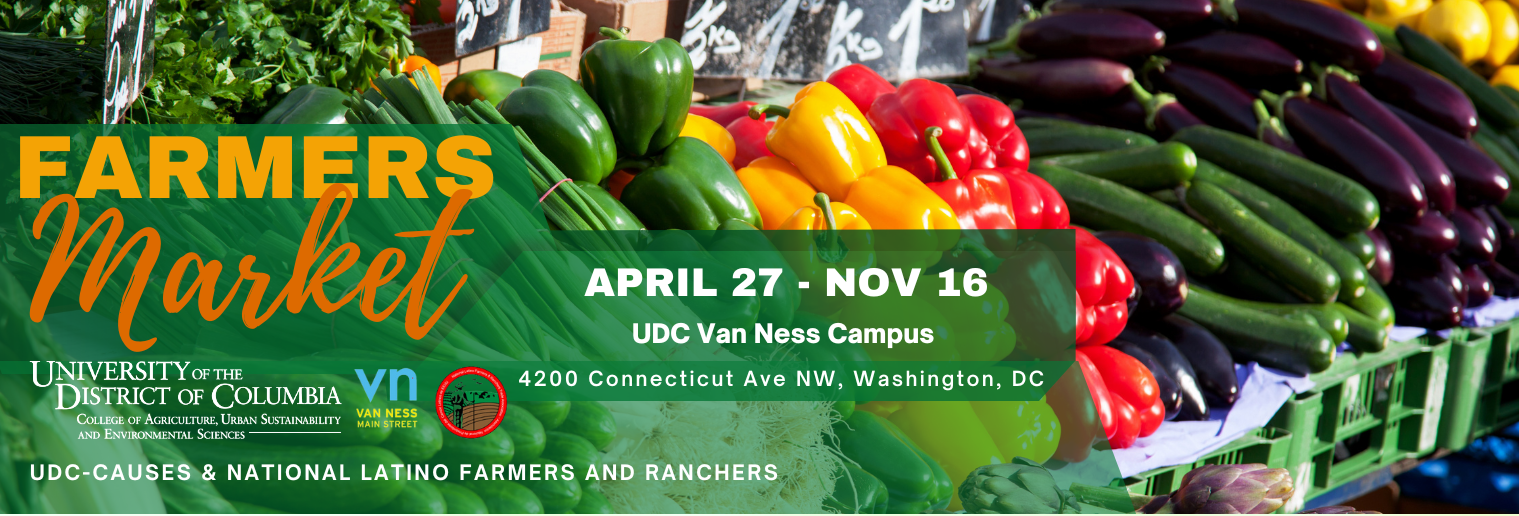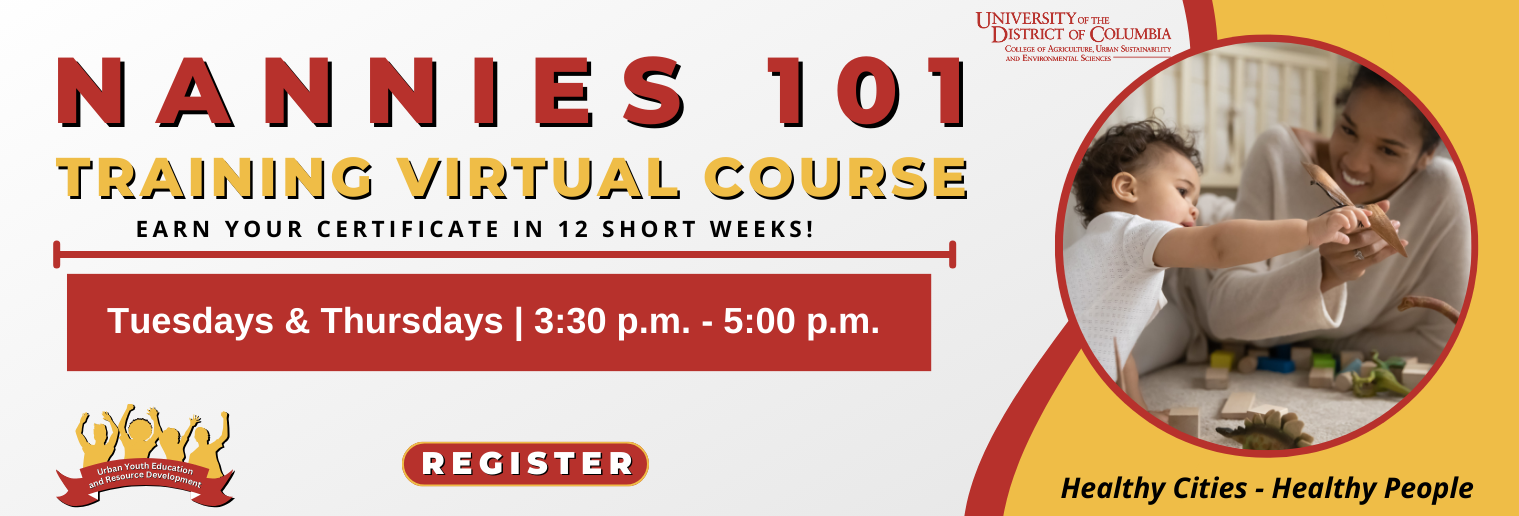| Nutrition and Dietetics |
| NUDT-104 INTRO TO NUTRITION LAB (1) |
| Pre-requisite: None. Co-requisite: NUDT 106. Students will collect personal dietary data using various techniques and analyze the nutrient composition and compare findings with the Dietary Recommended Intakes appropriate for age and gender. Water samples from students’ homes will be tested for lead and other substances utilizing the UDC Environmental Quality Testing Lab. Students will analyze organic and inorganic nutrients from a 24-hour menu using homogenates that simulate digestion using blender. Students will develop skills to collect anthropometric measurements on themselves and their classmates and evaluate the results. Students will submit written lab reports based on scientific laboratory format. |
| NUDT-106 INTRO TO NUTRITION (3) |
| Prerequisite: None; Co-requisite: NUDT 104. This course prepares students of all disciplines to improve the nutritional health for themselves, their families, and their communities. It meets the university-wide life science requirement. Factors that affect the food choices of individuals across cultural groups will be emphasized. Basic information on the classification, chemistry, functions, and metabolism, and deficiency symptoms and dietary sources of essential nutrients will be discussed. Students will discuss basic issues of energy balance and utilize diet-planning guides, including MyPlate. Each student will research a nutrition topic from evidence-based sources and will present their findings to the class. Students will volunteer at a nutrition-related site in the District of Columbia area. |
| NUDT-103 INTRO FOOD SCIENCE LAB (1) |
| Prerequisite: none; Co-requisite NUDT-105.Students will develop laboratory skills to examine the characteristics of raw food materials and to explore the development, preparation, and preservation of food. This lab course runs for three hours. |
| NUDT-105 INTRO TO FOOD SCIENCE LEC (3) |
| Prerequisite: none; Co-requisite: NUDT-103. Students will explore food science and food technology through examination of the early history of food and the development of the food industry to the present. Students will discuss current and future opportunities in the food industry with a focus on emerging careers for food scientists and food engineers in a society that focuses on sustainability of resources. Students will develop an understanding of the general characteristics of raw food materials, harvesting, and processing of foods. They will learn about methods of food preparation that preserve the color, flavors, and nutrient content of foods. |
| NUDT-209 FOOD PROCESSING I LAB (3) |
| Prerequisites: NUDT 103, 105. Co-requisite: NUDT 211. Students will have the opportunity to can, freeze, dehydrate, and ferment foods. |
| NUDT-442 FOOD CHEMISTRY LAB (1) |
| Prerequisite: NUDT-344/345 (Nutritional Biochemistry); Co-requisite: NUDT 444. Three hours of laboratory per week where students analyze the changes that occur during processing and utilization of foods using state-of-the art chemical, physical and instrumental methods. |
| NUDT-444 FOOD CHEMISTRY, LEC (3) |
| Prerequisite: CHEM-461 (Biochemistry); Co-requisite: NUDT 442. This course emphasizes the basic composition, structure and properties of food and the chemistry of changes that occur to foods during processing and utilization. |
| NUDT-490 SENIOR SEMINAR AND RESEARCH (2) |
| Prerequisite: Senior standing in the Nutrition Program and permission of Department Chairperson and faculty research advisor. This capstone course involves critical review of literature on recent research in nutrition, dietetics, and food science and acquiring competency in writing proposals, conducting research, and presenting the research findings. Research will be conducted under the direction of Nutrition Department faculty members. Arrangements can be made to work under a preceptor outside of the university in collaboration with a UDC faculty advisor. Suggested sites of research include, but are not limited to, USDA Agricultural Research Center (ARC), UDC Agricultural Experiment Station, the UDC Environmental Quality Testing Lab, and other agencies and organizations located in the Greater Washington Metropolitan Area identified by the student and faculty research advisor. Submission of a written undergraduate thesis is required. All students enrolled in this course must earn certification in Responsible Conduct of Research before they can begin their research. |
|
| Nutrition and Dietetics Option |
|
| NUDT-313 NUTRITION IN THE LIFE CYCLLE (3) |
| Prerequisite: NUDT-106 (Introduction to Nutrition). Field visits to selected federal government and community agencies in the District of Columbia and guest speakers from organizations such as La Leche League highlight this course. How nutrient requirements are altered by physical development throughout life, from preconception, prenatal development, lactation, and adolescence to aging is covered. Students will translate this information into practical pointers in providing quality nutrition care for individuals and groups at various stages of development. Students will research and present reports on important community-based programs that span the life cycle. Oral presentations and peer assessment are emphasized. This course is targeted not only for nutrition and dietetics majors, but also for those in related fields of study, including nursing, education, public health, social work, counseling, and psychology. It is anticipated that beginning Spring 2013, part of this course will be taught online. |
| NUDT-314 COMMUNITY NUTRITION PRACTICUM (1) |
| Prerequisite: NUDT-106 (Introduction to Nutrition) and permission of instructor/chairperson; Co-requisite: NUDT-314 (Practicum). Selected organizations located in and around the District of Columbia, including public and charter schools, Head Start, WIC, and D.C. Public Housing, will provide students with real-life challenges to address. Students will apply strategies to meet nutrition needs outside of acute-care settings, with emphasis on nutrition education and food assistance programs. Students will gain an understanding of the complexities of the external environment on health outcomes. Students will be required to travel to local community nutrition sites during the semester. |
| NUDT -316 COMMUNITY NUTRITION, LEC (3) |
| Prerequisite: NUDT-106 (Introduction to Nutrition) and permission of instructor/chairperson; Co-requisite: NUDT-314 (Practicum). An introduction to programs, policies, and institutions that influence nutrition services at the local, state, and national levels. Supports the development of skills needed to practice nutrition in community settings with special attention to populations at high nutritional risk. Nutrition assessment, program planning and evaluation, and cultural competency are emphasized. Advocacy is an underlying theme for discussions and for individual and group projects. Certificates in (1) Protecting Human Research Participants and (2) Responsible Conduct of Research are expected to be earned by end of course. |
| NUDT-320 NUTRITION EDUCATION, LEC (3) |
| Prerequisite: NUDT-106 (Introduction to Nutrition); Co-requisite: NUDT-321. This course includes a survey of the philosophy, principles and methods of nutrition education. Discussions include reliable sources of nutrition information, tools and skills used in managing nutrition programs, and various aspects of nutrition surveillance, nutrition care and promotion. Cultural competency and effective communication are stressed. Guest speakers from agencies within USDA and other federal and District of Columbia departments will join the class throughout the semester. This course is targeted not only for nutrition and dietetics majors, but also for those in related fields of study, including nursing, education, public health, social work, counseling, and psychology. |
| NUDT-321 NUTRITION EDUCATION, PRACTICUM (1) |
| Prerequisite: NUDT-106 (Introduction to Nutrition); Co-requisite: NUDT-320. Students will develop appropriate tools for nutrition education, including writing lesson plans and nutrition education evaluation tools. Developing curriculum, learning objectives, and goals for nutrition programs are also reviewed. Counseling skills also developed through in-class and field experiences scheduled in sites across the District of Columbia, including public and charter schools, faith-based organizations, and senior-citizen wellness sites. Participation in a mock Toastmasters International session will provide students with the opportunity to develop their communication and public speaking skills beyond the classroom. Nutrition Education generally precedes Geriatric Nutrition. |
| NUDT-322 NUTRITION ASSESSMENT, LEC (3) |
| Prerequisite: NUDT 317. Co-requisite: NUDT-323. This course emphasizes strategies to assess the need for adaptive feeding techniques, including alternative feeding modalities and drug and nutrient interactions. Students will design and implement intervention in urban and diverse population groups.Using role play and patient simulations, students will interpret and apply medical and nutrition terminology, examine interactions between drugs and nutrients, and apply Nutrition Care Process and nutrition intervention. Using profiles of residents of the District of Columbia, students will develop skills in evaluating, documenting, and simulating patient records, implementing culturally competent Medical Nutrition Therapy (MNT), applying evolving methods of nutritional assessment and support, and interpretating laboratory parameters. |
| NUDT-323 NUTRITION ASSESSMENT PRACTICUM (1) |
| Prerequisite: NUDT-317; Co-requisite- NUDT-322. This course features opportunities for students to interact with clients and patients in underserved clinical settings located in medically underserved areas of the District of Columbia. Students will perform nutritional screenings and assessments, analyze and present nutritional data, assess nutritional status, and document patient’s/client’s medical record. This course enables students to acquire skills in assessing, planning, calculating and implementing Total Parenteral Nutrition (TPN) and Enteral Feeding. Students will present dietary habits of diverse population groups while exhibiting cultural competence and will present scientific literature on choices of alternative nutrition therapies. |
| NUDT-344 NUTRITIONAL BIOCHEMISTRY LECTURE (3) |
| The course is designed to facilitate the understanding of biochemical principles and concepts to human nutrition. The course content will include structure, metabolism and functions of biological nutrients-Water, Proteins , Carbohydrates, Lipids and Minerals. Topics like bioenergetics; intermediary metabolism, regulation of metabolic control and enzymes, vitamins and co-factors, will be included. Biochemistry of cellular signaling including membrane structure and function, hormones, and signal transduction, nucleic acids, gene expression and regulation will be covered. Emphasis is placed on metabolic pathways, the interrelationships of major nutrients and the relation of metabolic processes to the overall nutritional health of an individual. |
| NUDT-345 NUTRITIONAL BIOCHEMISTRY LAB (1) |
| Principles of protein folding and structure; methods for determining protein structure; protein structure prediction and modeling, contents of structural databases, structure visualization, structure validation and analysis, rational mutagenesis, computational biochemistry tools. Explores biotechnology techniques for DNA cloning and analysis: DNA sequencing, sequence analysis by computer, plasmid cloning. |
| NUDT-374 GERIATRIC NUTRITION (2) |
| Prerequisite: NUDT-106 and permission of instructor/chairperson; Co-requisite NUDT-375 (Practicum). This course is an overview of the physiological, psychological, and socioeconomic aspects of aging and their impact on nutritional health. This course includes in-depth discussions of nutritional assessment, nutrition programs, and chronic medical disorders associated with the older adult. Students will be required to present specific topics to their peers in an interactive manner throughout the semester. Geriatric Nutrition generally precedes Therapeutic Nutrition I and II and serves as an introduction to the diseases and conditions that are covered in more depth and over additional life cycles in subsequent courses |
| NUDT-375 GERIATRIC NUTRITION, PRACTICUM (1) |
| Prerequisite: NUDT-106 (Introduction to Nutrition) and permission of instructor/chairperson; Co-requisite: NUDT-374. Under the supervision of registered dietitians, student will work with older adults in various agencies across the District of Columbia. Students will develop or adapt lesson plans and provide nutrition education and nutrition screening to this population. Students may conduct food demonstrations, when applicable. A panel of senior citizens, in the format of “speed-dating,” is the highlight of this course. |
| NUDT-421 THERAPEUTIC NUTRITION I, LEC (3) |
| Pre-requisite: NUDT-317, NUDT-322 and permission of instructor/chairperson; Co-requisite: NUDT-423 (Lab). This course features opportunities for students to interact with clients and patients in underserved clinical settings located in medically underserved areas of the District of Columbia. Students will explore the pathophysiology, role of medications and the use of Nutrition Care Process to identify nutrition-related problems and determine and evaluate nutrition interventions and Medical Nutrition Therapy for Diabetes, Cardiovascular and Renal Diseases. |
| NUDT 422 THERAPEUTIC NUTRITION II, LEC (3) |
| Prerequisites: NUDT-317, NUDT-322 and permission of instructor/chairperson; Co-requisite: NUDT-423 (Lab). This course features opportunities for students to interact with clients and patients in underserved clinical settings located in medically underserved areas of the District of Columbia. Students will examine the physiology, pathology, risk factors and medical nutrition therapy for management of the following conditions: Cancer, Gatrointestinal Diseases, Diseases of the Nervous System, Eating Disorders, Alzheimer’s, Parkinson’s, and Food Allergies. |
| NUDT-423 THERAPEUTIC NUTRITION I, LAB (1) |
| Pre-requisite: NUDT-317, NUDT-322; Co-requisite: NUDT-421. Students will obtain hands-on clinical experiences and opportunities to work, under the supervision of registered dietitians, in local hospitals and long-term medical care facilities to assess, diagnose, chart and plan Medical Nutrition Therapy for patients with Diabetes, Cardiovascular and Renal Diseases. |
| NUDT-424 THERAPEUTIC NUTRITION II, LAB (1) |
| Co-requisite-NUDT-422 (Lab). Pre-requisite NUDT-317, NUDT-322. Course offers opportunities to explore and conduct research on environmental pollutants in the air, food and water in communities located in the District of Columbia. Students will work with patients living with allergies, cancer, gastrointestinal and neurological disorders to plan supporting strategies and Medical Nutrition Therapy. Students will participate in panel discussions applying evidence-based research and Medical Nutrition Therapy on all diseases covered in the lecture course. Patient simulations will also be incorporated. |
| NUDT-426 FOOD SYSTEMS MANAGEMENT I, LEC (2) |
| Pre-requisite NUDT 106. Co-requisite NUDT 428. The course emphasizes planning various types of hospital menu as the focal point of food service and offers skills to analyze and interpret nutrient composition of menus. Students will identify different types of food service operations, including food production, food delivery systems, quantity food production, procedures and principles of food procurement, markets, buyers, methods of purchasing, food receiving and storage, specifications, inventory records, recipe development and standardization, production control, production scheduling and demonstration of basic food preparation and presentation skills. |
| NUDT-428 FOOD SYSTEMS MANAGEMENT I, PRACTICUM (1) |
| Prerequisite: NUDT 106. Co-requisite NUDT 426. Students will visits various local food service facilities to observe food service operations including menus, production records, procurement, ordering and receiving foods, food specifications, food inventory and food production and tray line management. The students submit visitation records and provide a summary of analysis and critiques of the facilities visited. The course provides the opportunity to complete a portfolio; simulates interviewing prospective candidates for the dietary department; provides opportunities to network with representatives of Consumer Regulatory Affairs to observe commercial food service operations. |
| NUDT-427 FOOD SYSTEMS MANAGEMENT II (2) |
| Prerequisite: NUDT-106. Co-requisite: NUDT-429. Student will integrate the process and tools used in effective management, theories of management, and administrative leadership. Topics covered in this course include Total Quality Management, mechanics of cost control, planning of physical facility in relation to its needs and equipment, quality assurance in food production, and use of technology in food service institutions. |
| NUDT-429 FOOD SYSTEMS MANAGEMENT II PRACTICUM (1) |
| Prerequisite: NUDT-106. Co-requisite: NUDT-427. This is a hands-on lab course where students visit food service facilities located in the District of Columbia. Students will develop management tools, monitor quality assurances, and design floor plans for a simulated operational food service facility. Students will prepare documents for applying for state licensure for operating a food service facility. |
| NUDT 520 Medical Nutrition Therapy III (3) |
| Pre-requisite NUDT-422 and 424. This course emphasizes the relationship of Xenobiotics to health inclusive of cancer, cardiovascular disease, diabetes, and other health issues. The students will discuss and present the biochemical functions of minerals and vitamins. The course will emphasize the comprehensive study of assessment of nutrition status by various methods, study of data collection techniques, nutrient analysis and dietary modifications, the new nutrition care process, and methods of nutritional support; current reimbursement issues, policies and regulations. Critical appraisal of published literature on specific topics in the above field will be prepared and presented by the students. |
| NUDT 530 Pharmacology for Nutrition Professionals, Medical Nutrition Therapy IV (3) |
| Prerequisite- NUDT-520. This course provides an integrated approach to the biochemical functions and nutritional metabolism and drug-nutrient interactions of fat-soluble and water-soluble vitamins. The course will emphasize on the comprehensive study of terms used by health care practitioners to describe laboratory, radiology, pathology procedures and pharmacological products by body systems. Other topics covered are, pharmomacokinetics, pharmacodynamics, bioavailability and biotransformation of drugs, drug-nutrient interactions of antibiotics, antiviral drugs, IV and TPN fluids, anesthetics, anti-histamine, autonomic, cardiovascular, central nervous system, gastrointestinal, hormones and synthetic substitutes, heavy metal antagonists, non-prescription drugs, herbal supplements and chemotherapeutic agents. |
| NUDT 501 Nutritinal Epidemiology (2) |
| Prerequisite: None. This course introduces principles of epidemiology and methods used in the investigation of health-related events. The course will examine and emphasize detection of trends in disease and nutrition, including the distribution of disease or other health-related states and events in human populations. Discussion on factors , especially in the urban population,(e.g., age, sex, occupation, ethnicity, and economic status) that influence this distribution, and the application of this study to control health problems will be emphasized. Topics covered are: basic epidemiology, statistical methods, and analytical issues related to diet and disease. |
| NUDT 650 Nutrition Research Methods (2) |
| Prerequisite: Senior standing in the Graduate Nutrition Program and permission of Department Chairperson and faculty research advisor. This course involves critical review of literature on recent research in nutrition and dietetics, and acquiring competency in writing proposals, conducting research, and presenting the research findings. Research will be conducted under the direction of Nutrition Department faculty members. Arrangements can be made to work under a preceptor outside of the university in collaboration with a UDC faculty advisor. Suggested sites of research include, but are not limited to, USDA Agricultural Research Center (ARC), UDC Agricultural Experiment Station, the UDC Environmental Quality Testing Lab, Georgetown University and other agencies and organizations located in the Greater Washington Metropolitan Area identified by the student and faculty research advisor. Submission of a written graduate thesis is required. All students enrolled in this course must earn certification in Responsible Conduct of Research before they can begin their research. The students should take an English Proficiency class prior to enrolling in the Nutrition Research methods |




